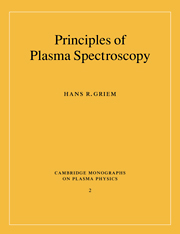Book contents
- Frontmatter
- Contents
- Preface
- Symbols
- 1 Classical theory of radiation
- 2 Quantum theory of radiation
- 3 Oscillator and line strengths
- 4 Spectral line broadening
- 5 Continuous spectra
- 6 Cross sections and level kinetics
- 7 Thermodynamic equilibrium relations
- 8 Radiative energy transfer
- 9 Radiation losses
- 10 Spectroscopic density measurements
- 11 Spectroscopic temperature measurements
- 12 Other diagnostic applications of plasma spectroscopy
- References
- Index
1 - Classical theory of radiation
Published online by Cambridge University Press: 29 August 2009
- Frontmatter
- Contents
- Preface
- Symbols
- 1 Classical theory of radiation
- 2 Quantum theory of radiation
- 3 Oscillator and line strengths
- 4 Spectral line broadening
- 5 Continuous spectra
- 6 Cross sections and level kinetics
- 7 Thermodynamic equilibrium relations
- 8 Radiative energy transfer
- 9 Radiation losses
- 10 Spectroscopic density measurements
- 11 Spectroscopic temperature measurements
- 12 Other diagnostic applications of plasma spectroscopy
- References
- Index
Summary
Although most of the electromagnetic radiation from many natural and laboratory plasmas is atomic in origin and therefore subject to quantum effects, it remains useful to introduce some of the basic radiative processes via classical theory. Other important foundations of plasma spectroscopy are atomic physics and plasma physics, especially the statistical mechanics of ionized gases. Generally, the basic theory is well established in these parent disciplines. However, the large variety of processes contributing to emission or absorption spectra often requires more or less drastic simplifications in their theoretical description or computer modeling. Critical experiments are playing an essential role in checking the reliability of various models and in delineating the region of their applicability.
Plasma spectroscopy, although being a highly specialized subfield, is at the same time a very interdisciplinary science. It not only owes its origins largely to astronomy, but also returns to astronomy and astrophysics methods of analysis of spectra and a multitude of basic data, which have both been subjected to experimental scrutiny. The state of stellar plasmas is significantly influenced by radiation, and the latter is more or less controlled by radiative energy transfer. Internally consistent treatments of the states of matter and radiation first developed by astronomers are now also becoming important for the description of plasma experiments.
- Type
- Chapter
- Information
- Principles of Plasma Spectroscopy , pp. 1 - 10Publisher: Cambridge University PressPrint publication year: 1997

